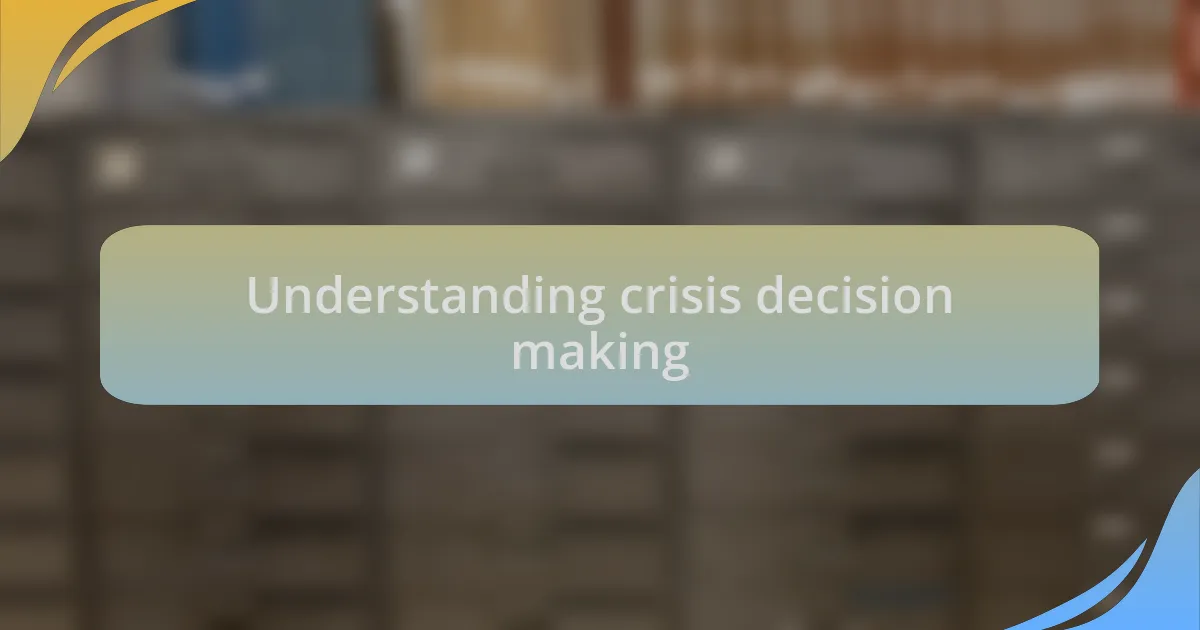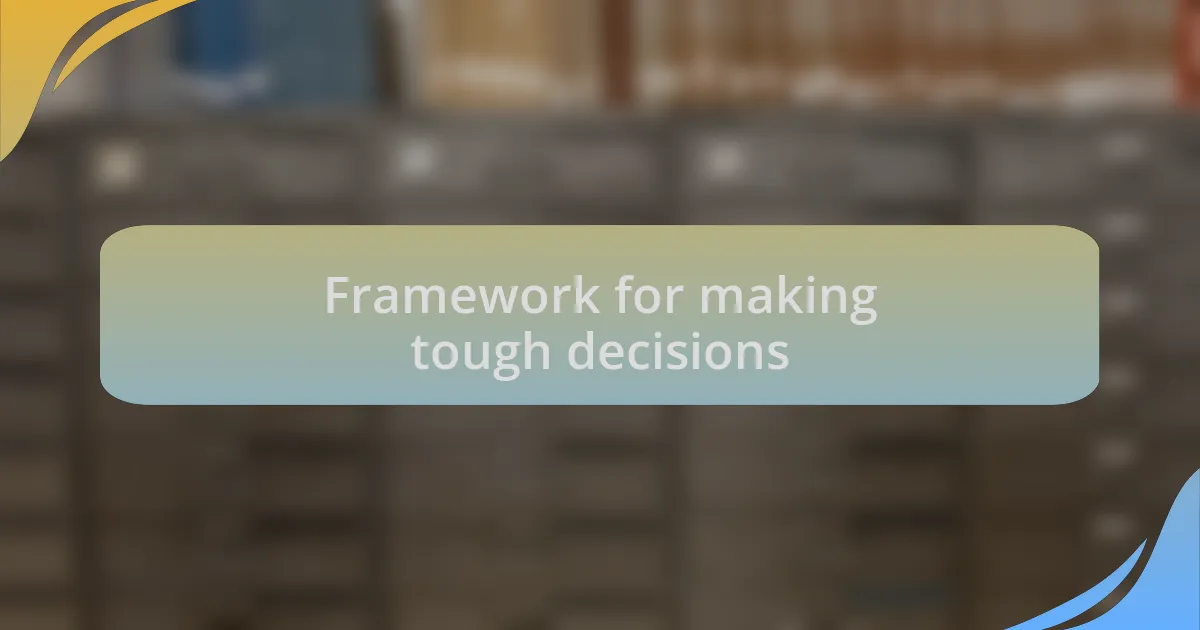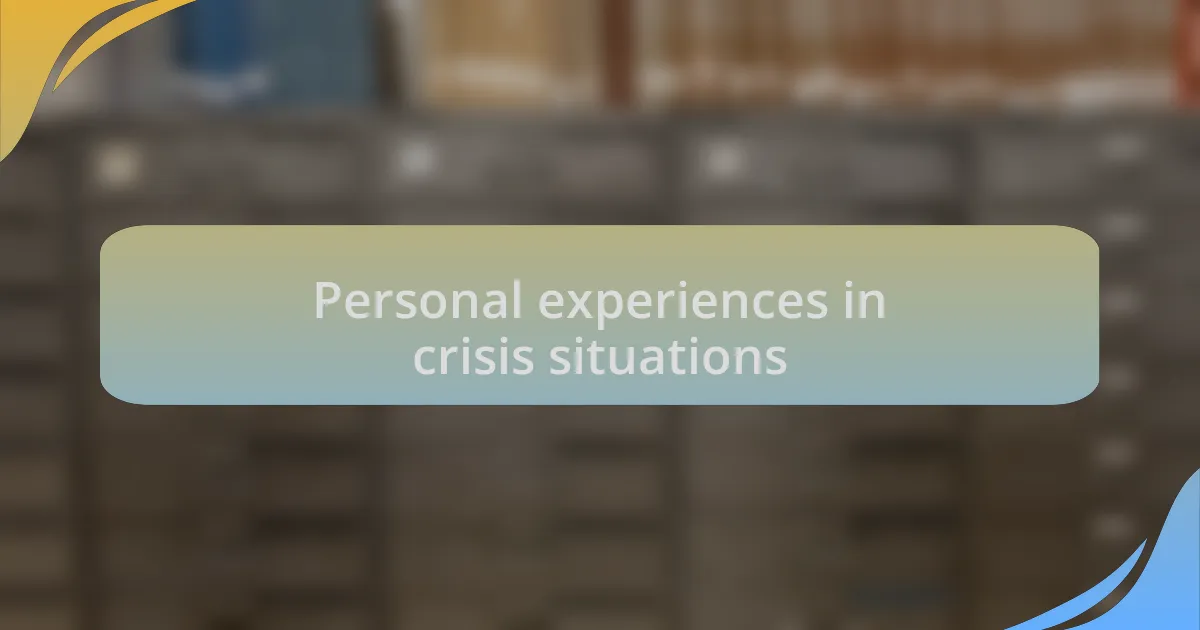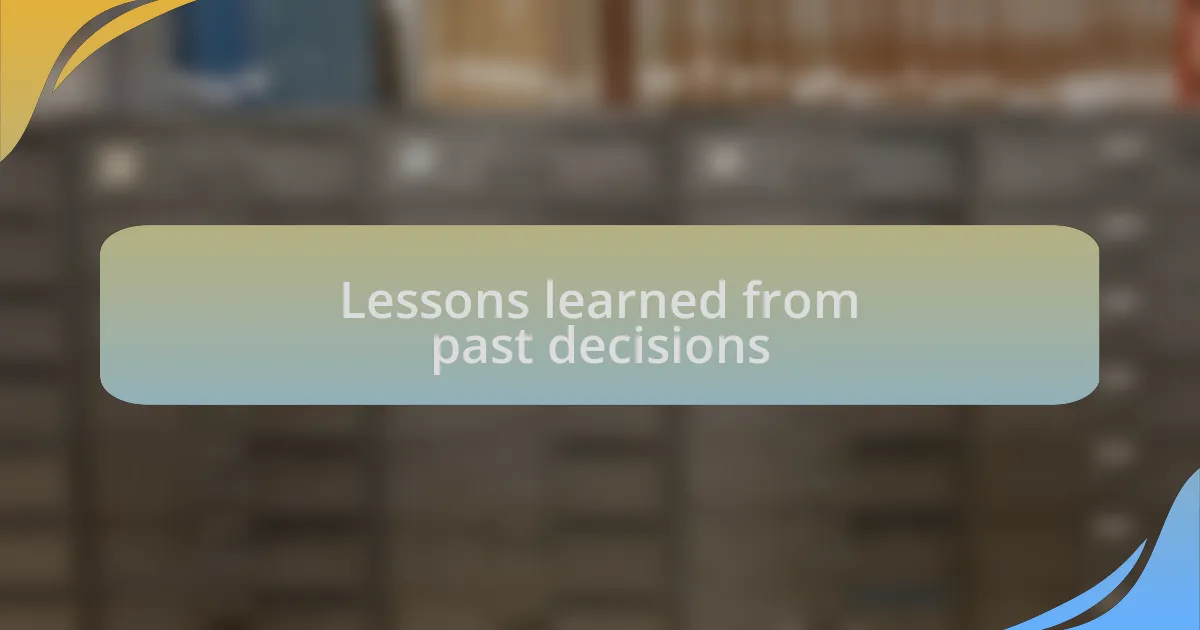Key takeaways:
- Crisis decision-making requires a balance of urgency and emotional intelligence, emphasizing the need for transparent communication to maintain morale.
- Implementing a structured framework helps assess the situation, evaluate options, and reflect on outcomes, enhancing decision-making in high-pressure scenarios.
- Personal experiences highlight the significance of emotional awareness and adaptability in team dynamics during crises, reinforcing the value of learning from past mistakes.
- Lessons from past decisions underscore the importance of thorough fact-checking, collaboration with other agencies, and embracing diverse perspectives to improve outcomes.

Understanding crisis decision making
Crisis decision-making is a high-stakes process that demands not only swift action but also emotional intelligence. I recall a time when a sudden threat required me to weigh options rapidly. The pressure was immense, and I often wondered: how can one balance urgency with the accuracy of information?
In my experience, understanding the situation holistically is crucial. It’s not enough to just react; evaluating the emotional landscape of those involved and anticipating their responses can shape outcomes profoundly. I learned this during an emergency response drill when the team’s morale hinged on transparent communication—it reminded me that clarity can calm chaos.
Another critical element is the need for adaptability. When faced with unforeseen challenges, I’ve found that rigid plans can quickly become obsolete. Being open to revising strategies in real-time makes a significant difference. What I often ask myself is: how flexible can I be without losing sight of our objectives? This balance, I believe, is the essence of effective crisis decision-making.

Framework for making tough decisions
Many times, I’ve identified a structured framework to enhance tough decision-making during crises. I often start with assessing the situation: what are the facts? Gathering critical information helps me understand the immediate needs and challenges. For instance, during a recent emergency, I took a moment to list the key variables involved rather than diving headfirst into the fray. This approach allowed me to visualize the potential outcomes.
Then comes the evaluation of options. I frequently ask myself: what are the implications of each choice? Just as I did in a past incident where our team faced resource shortages, weighing the pros and cons of every avenue led us to a solution that was both innovative and practical. This process can feel overwhelming, but breaking down complex decisions into manageable parts brings clarity amidst the chaos.
Finally, I emphasize the importance of post-decision reflection. After the dust settles, I make it a point to review the outcomes. Did the decision align with our goals? How did it affect the team? Reflecting on these aspects not only informs future decisions but also nurtures personal growth. This practice has often led me to insights about my own biases and helped me understand the emotional dynamics within my team, reinforcing the idea that every crisis is also an opportunity for learning.

Personal experiences in crisis situations
In one particular crisis, I remember feeling a surge of adrenaline when we encountered a sudden security breach. The clock was ticking, and I could feel the pressure mounting. In that moment, I chose to rely on instinct shaped by previous experiences and whispered a silent mantra to myself: stay calm and think clearly. This mantra helped ground me, allowing me to communicate effectively with my team, rather than succumbing to panic. Have you ever felt that rush that pushes you to act decisively? I can tell you, it’s an intense experience that ultimately leads you to make choices you never thought possible.
Another vivid memory comes from a natural disaster response I participated in, where we had to coordinate evacuations. I recall standing by the command center, grappling with the harsh reality of lives at stake. There was this deep sense of urgency, but I had to remind myself to focus on the task. I noticed how my emotions were mirroring my team’s anxiety; by acknowledging that emotional connection, we strengthened our resolve and worked cohesively. Isn’t it fascinating how emotions can drive teamwork during tough times?
Yet, not every decision I made was perfect. I’ve learned that reflecting on these moments is crucial. After a chaotic situation where I underestimated the logistics of a supply drop, I took the time to unpack that experience. I asked myself what I could have done differently and where my misjudgments stemmed from. This reflection didn’t just highlight my pitfalls; it transformed my approach for future crises, reinforcing the idea that analysis and growth arise from mistakes. Wouldn’t you agree that each missed opportunity can lead to personal improvement?

Lessons learned from past decisions
Reflecting on my past decisions during crises reveals some enlightening lessons. I recall a specific incident where we were faced with misinformation during a critical situation. My immediate reaction was to counter the false claims without fully verifying the facts. This haste taught me the importance of thorough fact-checking. Now, I understand that taking a moment to gather accurate information can not only mitigate panic but also strengthen trust within the team. Have you ever rushed to address misinformation only to realize later that it did more harm than good?
Another lesson emerged after a situation in which rival agencies were involved in a response. I learned firsthand how vital collaboration is when working in high-pressure environments. Rather than seeing these agencies as competitors, I decided to view them as partners. This shift in perspective eased tensions and opened channels of communication, leading to a more effective response. Do you think a change in mindset can significantly enhance cooperation in crisis management?
Looking back, I realize the power of humility in decision-making. There was a time when I was overly confident in a strategy that ultimately failed. This taught me to appreciate the value of diverse input, even when I felt certain. Seeking perspectives from various team members, regardless of their rank or expertise, has since become a priority for me. Isn’t it interesting how admitting uncertainty can often lead to stronger, more effective outcomes?